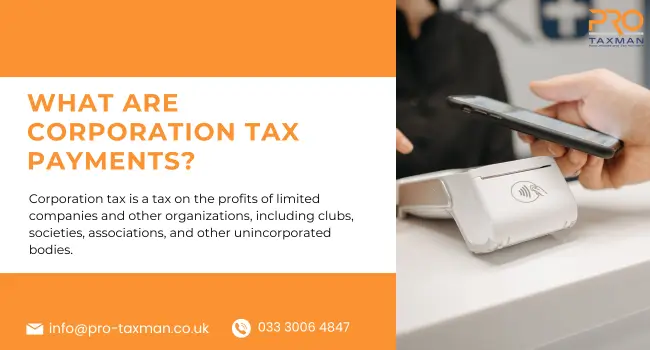Corporation tax is a tax on the profits of limited companies and other organizations, including clubs, societies, associations, and other unincorporated bodies. Here’s an overview of the key aspects of corporation tax payments.
Who is responsible for paying corporation tax?
- Limited companies.
- Foreign corporations that have a branch or office in the UK.
- Clubs, societies, associations, cooperatives, and other unincorporated organizations.
Taxable income
Corporation tax is calculated on the company’s taxable income, which includes:
- Trading Profits: Profits from day-to-day business operations.
- Investment Income: Income from investments, such as interest and dividends.
- Capital Gains: Profits from selling assets like property or shares.
Corporation Tax Rates
The rate of corporation tax depends on the level of profits:
1. Main Rate (25%)
- Effective Date: From April 1, 2023.
- Applies To: Companies with annual taxable profits exceeding £250,000.
2. Small Profits Rate (19%)
- Effective Date: From April 1, 2023.
- Applies To: Companies with annual taxable profits up to £50,000.
3. Marginal Relief
- Effective Date: From April 1, 2023.
- Applies To: Companies with annual taxable profits between £50,000 and £250,000.
- Function: Marginal relief provides a gradual increase in the corporation tax rate from 19% to 25% as profits increase from £50,000 to £250,000.
Corporation Tax Return (CT600)
The Corporation Tax Return (CT600) is a form that companies must submit (HMRC) to report their taxable profits and calculate their corporation tax liability.
The CT600 form has multiple sections where companies must report:
- Company Information: Basic information about the company, such as its name, registration number, and accounting period.
- Profit and loss: The statements provide detailed information about the company’s income and expenses, such as trade earnings, investment income, and capital gains.
- Profit Adjustments: Any tax-related adjustments to profits, such as disallowed expenses or capital allowances.
- Tax Calculations: The calculation of the corporation tax due, including any reliefs or deductions claimed.
- Supplementary pages: Additional information is necessary for certain situations, such as claims for group relief, research and development relief.
Filing and payment deadlines of corporation tax return
- Filing: Companies must file their corporation tax return (CT600) with HMRC within 12 months after the end of the accounting period.
- Late Filing Penalties: Penalties for late filing of corporation tax returns start at £100 and increase with continued delay.
- Payment: Corporation tax must be paid within 9 months and 1 day after the end of the accounting period for most companies. For companies with profits exceeding £1.5 million, payments must be made in quarterly installments.
- Late Payment Interest: Interest is charged on late payments of corporation tax.
These deadlines ensure that companies remain compliant with HMRC regulations and avoid unnecessary penalties and interest.
Reliefs and Allowances
Several reliefs and allowances can reduce the amount of corporation tax payable, including:
- Research and Development (R&D) Relief: Enhanced deductions for qualifying R&D expenditure.
- Capital Allowances: Deductions for capital expenditure on assets like machinery and equipment.
- Creative Industry Tax Reliefs: For companies in the film, animation, and video game industries, among others.
The companies should ensure they are aware of and apply all relevant reliefs and allowances to minimize their tax liabilities effectively.
Conclusion
Corporation tax is a critical financial requirement for businesses, and it requires accurate calculation, timely filing, and fast payment to avoid penalties and interest. For specific and detailed advice, it is always best to consult with a tax advisor or accountant who can provide guidance according to your specific situation.

